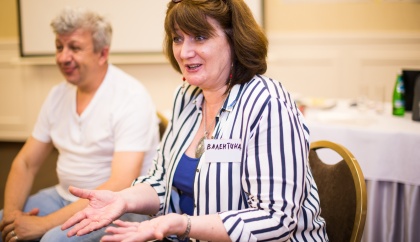
We opened our first film club a year ago in children’s summer camp “Primorskiy” on the Arabat Spit. This year, already having a successful experience, we organized a competition to create a network of similar film clubs in Ukrainian children’s summer camps.
We opened our first film club a year ago in children’s summer camp “Primorskiy” on the Arabat Spit. This year, already having a successful experience, we organized a competition to create a network of similar film clubs in Ukrainian children’s summer camps.
In the end of May twelve competition winners went through a 6-day Human rights and Media education school. School trainers Oleg Ohredko and Valentina Potapova explain why talking to children aboun human rights is important, and how documentary films help.
Oleg Ohredko, national trainer of “Understanding Human Rights” program, Travelling Docudays UA regional coordinator, media education expert:
“Unfortunately, questions of children’s education in human rights don’t get attention from the state or society. The main reason of this is certain nihilism in their understanding. These questions get some attention at schools, but the process is distorted, first of all because teachers lack required education level. Besides that, the state itself isn’t interested in developement of human rights education. This results in a very low level of understanding. Children’s camps can contribute to such education. Documentary films are unusual to most children, they are something quite new, provide new impressions, new knowledge, new approaches. Especially if it’s not just a screening, but an interactive and interesting process.”
Valentina Potapova Ukrainian Heksinki Human Rights Union, project coordinator, Deputy Head of “Almenda” civic education centre, media education expert:
“There is a practice of substitution in understanding of human rights. Unfortunately this allows to use them as “pedagogic” instrument to manipulate opinions in discussions about modern school. But human rights education and teaching democratic values at schools and children’s camps go together. Children’s camps aim to form self-government skills, which is teaching democracy. That’s why studying and using children’s rights with the help of documentary films helps children undestand what is the basis of human rights, see the big picture and realise that they are the subjects of human rights, that they can adopt them and use them in their lives.”
Docudays UA film clubs were founded in the following children’s camps:
Children’s camp “Moloda Gvardiya”, Odessa.
Intagration camp “Stronger together”, Odessa.
School camp “Dyvosvit”, Kryvyi Rig.
Children’s health camp “Primorskiy”, Shchaslyvtseve village, Arabat Spit.
School work and rest camp “Zmina”, Nosachiv, Cherkasy region
Children’s health camp “Red carnation”, Berdyansk
Camp “Lisova zastava”, Dymer urban-type settlement, Kyiv region
European camp-2016, Slavske urban-type settlement, Lviv region
Library camp “Summer is time to read”, Odessa
Camp “Rainbow”, Melitopol, Zaporizhzhia region
School language camp “Friendship”, Kropyvnytskiy
Detailed information on the activities can be found at camps’ webpages.
All news



